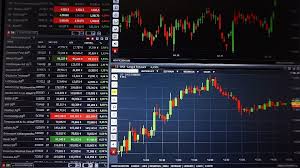Beginner Forex Trading A Comprehensive Guide 1749216641

A Beginner’s Guide to Forex Trading
Forex trading can seem overwhelming for those who are just starting out. However, with the right understanding and approach, it can become a rewarding venture. This guide aims to provide essential information that arms you with the knowledge needed for successful forex trading. If you’re exploring beginner forex trading Trading Brokers in Vietnam, you’ll also find useful insights here.
Understanding Forex Trading
Forex, or foreign exchange, involves exchanging one currency for another in the hopes of making a profit. The forex market is the largest financial market globally, with a daily trading volume exceeding $6 trillion. Unlike stock markets, the forex market operates 24 hours a day, five days a week, allowing traders to buy and sell currencies at any time.
The Basics of Currency Pairs
In forex trading, currencies are traded in pairs. A currency pair consists of two currencies – the base currency and the quote currency. The base currency is the first currency listed in the pair, and the quote currency is the second. For example, in the currency pair EUR/USD, the Euro (EUR) is the base currency, and the U.S. Dollar (USD) is the quote currency. The price of the pair indicates how much of the quote currency is needed to purchase one unit of the base currency.
Types of Forex Market Participants
There are several types of participants in the forex market, including:
- Retail Traders: Individual traders who buy and sell currencies for personal profit.
- Institutional Traders: Large financial organizations such as banks or hedge funds that trade significant volumes.
- Corporations: Businesses that operate internationally and need to convert currencies for trade.
- Central Banks: National banks that manage their country’s currency and monetary policy.

Choosing a Forex Broker
One of the first steps in forex trading is selecting a broker. The right broker will provide you with the trading platform, tools, and resources necessary for success. Here are some factors to consider when choosing a forex broker:
- Regulation: Ensure the broker is regulated by a reputable authority.
- Spreads and Commissions: Look for competitive spreads and low commission rates.
- Trading Platform: Check if the broker offers a user-friendly trading platform.
- Customer Service: Reliable customer support can be crucial, especially when issues arise.
Developing a Trading Strategy
Successful forex trading requires a solid strategy. Here are some popular trading strategies for beginners:
- Scalping: This involves making numerous trades throughout the day to capture small price movements.
- Day Trading: Traders open and close positions within the same day to capitalize on short-term market movements.
- Swing Trading: This strategy involves holding positions for several days or weeks to benefit from price “swings.”
- Position Trading: Long-term strategy where trades are held for months or years based on fundamental analysis.
The Importance of Risk Management
Risk management is vital in forex trading. Protecting your capital should always be a priority. Here are some risk management strategies:
- Stop-Loss Orders: These are designed to limit potential losses by automatically closing a position at a certain price point.
- Position Sizing: Determine how much of your capital to risk on a single trade based on your trading strategy.
- Diversification: Avoid putting all your capital into one trade or currency pair; spread your investments across multiple trades.
Utilizing Technical and Fundamental Analysis
To make informed trading decisions, you should incorporate both technical and fundamental analysis into your strategy.

Technical Analysis: This involves studying historical price data and using charts and indicators to predict future price movements. Common indicators include moving averages, Relative Strength Index (RSI), and Fibonacci retracement levels.
Fundamental Analysis: This looks at economic indicators, news events, and geopolitical factors that can influence currency values. Pay attention to interest rates, economic growth, employment data, and inflation rates.
The Role of Emotions in Trading
Emotional control is crucial in forex trading. Trading based on emotions such as fear or greed can lead to poor decision-making. Developing a disciplined mindset and adhering to your trading strategy can help you manage your emotions effectively.
Continuous Learning and Practice
The forex market is constantly changing, and continuous learning is essential for long-term success. Consider using demo accounts to practice trading without risking real money. This allows you to familiarize yourself with the trading platform and test your strategies.
Conclusion
Forex trading can be an exciting and profitable journey for beginners. By understanding the fundamentals, developing a sound strategy, and managing risks, you can navigate the forex market with confidence. Remember to stay informed, practice regularly, and continuously enhance your trading skills. With dedication, you can turn your forex trading aspirations into reality.